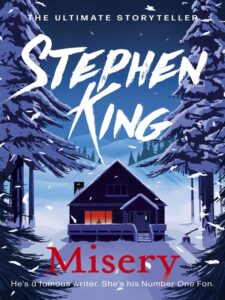 Spooky Season = Stephen King
Spooky Season = Stephen King
By Victoria Lafean, Adult Programming Librarian
With the chillier season coming upon us, I tend to look forward to a snuggle on the couch with a blanket, a fire in the fireplace, and a good book. The author I tend to gravitate to is Stephen King. Below you will find the horrors and thrillers you are used to from Stephen King, yet there are some more lighthearted stories that include love, acceptance, and coming of age. He is the “King” for a reason.
Jack Torrance’s new job at the Overlook Hotel is the perfect chance for a fresh start. As the off-season caretaker at the atmospheric old hotel, he’ll have plenty of time to spend reconnecting with his family and working on his writing. But as the harsh winter weather sets in, the idyllic location feels ever more remote and sinister. The only one to notice the strange and terrible forces gathering around the Overlook is Danny Torrance, a uniquely gifted child.
Paul Sheldon is a bestselling novelist who has finally met his number one fan. Her name is Annie Wilkes, and she is more than a rabid reader–she is Paul’s nurse, tending his shattered body after an automobile accident. But she is also furious that the author has killed off her favorite character in his latest book. Annie becomes his captor, keeping him prisoner in her isolated house. Annie wants Paul to write a book that brings Misery back to life–just for her. She has a lot of ways to spur him on. One is a needle. Another is an axe. And if they don’t work, she can get really nasty.
David Drayton, his son Billy, and their neighbor Brent Norton head to the local grocery store to replenish supplies following a freak storm. Once there, they and other local citizens are trapped by a strange mist that has enveloped the town and in which strange creatures are lurking. The Mist is a quick little journey into the frightened mind, and the way fear plays itself out within a group of strangers.
“Bag of Bones” by Stephen King
“Bag of Bones” recounts the plight of 40-year-old bestselling novelist Mike Noonan, who is unable to stop grieving even four years after the sudden death of his wife, Jo, and who can no longer bear to face the blank screen of his word processor. Noonan receives paranormal visitations and unknowingly falls in love with a young woman and her daughter. He then becomes involved in a very ugly and violent custody battle.
“The Girl who loved Tom Gordon” by Stephen King
Trisha McFarland was to spend Saturday with her older brother, Pete, and her recently divorced mother on a hike in the Appalachian Trail. When she wanders off to escape their constant bickering. Trisha strays deeper into a wilderness full of peril and terror. For solace she tunes her Walkman to broadcasts of Boston Red Sox games and the performances of her hero, number 36, pitcher Tom Gordon. This story explores our deep dread of the unknown and the extent to which faith can conquer it and a girl’s steadfast spirit.
“Dolores Claiborne” by Stephen King
Forced by overwhelming evidence to confess her life of crime, Dolores Claiborne, a foul-tempered New Englander, describes how her fractured marriage years before caused her heart to turn murderous. Suspected of killing Vera Donovan, her wealthy employer, Dolores Claiborne tells police the story of her life, harkening back to the suspicious death of her husband, thirty years earlier. Dolores also tells of Vera’s physical and mental decline and of her loyalty to an employer who had become emotionally demanding and vindictive.
“Gwendy’s Button Box” by Stephen King
There are three ways up to Castle View from the town of Castle Rock: Route 117, Pleasant Road, and the Suicide Stairs. Every day in the summer of 1974, twelve-year-old Gwendy Peterson had taken the stairs, up the cliffside to find solace and escape the teasing of peers. A stranger calls to her. There on a bench in the shade sits a man in black jeans, a black coat, and a white shirt unbuttoned at the top. On his head was a small, neat black hat. He gives her a beautiful button box. He explains that the button box can cause both chaos and good. Bewitched by the box, Gwendy takes it and goes home to hide it from her parents.
Sometimes growing up means facing your demons. The son of a struggling single mother, Jamie Conklin just wants an ordinary childhood. But Jamie is no ordinary child. Jamie has the ability to see what no one else can see and learn what no one else can learn. But the cost of using this ability is higher than Jamie can imagine—as he discovers when an NYPD detective draws him into the pursuit of a killer who has threatened to strike from beyond the grave. It is a terrifying and touching story of innocence lost and the trials that test our sense of right and wrong. It is a powerful, haunting, unforgettable exploration of what it takes to stand up to evil in all the faces it wears.
Manhattan Public Library is a cornerstone of free and equal access to a world of ideas and information for the Manhattan, Kansas community. Learn more at mhklibrary.org
###
Victoria Lafean, Adult Programming Librarian


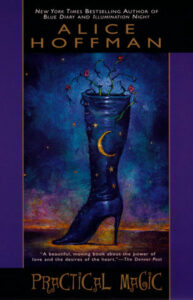 When the season begins to change, I often find myself remembering one of my favorite literary quotes: “I’m so glad I live in a world where there are Octobers.” This quote comes from L.M. Montgomery’s classic novel “
When the season begins to change, I often find myself remembering one of my favorite literary quotes: “I’m so glad I live in a world where there are Octobers.” This quote comes from L.M. Montgomery’s classic novel “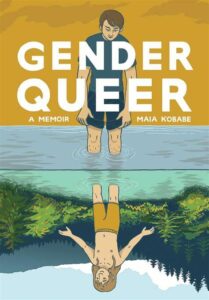 The American Library Association (ALA) does many things for the profession from establishing guidelines for librarians across the board, to ethical requirements, to hosting a public policy and advocacy board, and tracking book challenges across the country through their Office for Intellectual Freedom (OIF). The OIF has been tracking book challenges and collecting data about challenged books since 1990, while the ALA established its now famous ‘Banned Books Week’ in 1982. In 2006, the organizations started to release the State of the Libraries Report. The report is published yearly and reflects the data collected for the previous year. According to the ALA State of America’s Libraries Report for 2024, they documented “4,240 unique book titles targeted for censorship in 2023—a 65% surge over 2022 numbers—as well as 1,247 demands to censor library books, materials, and resources…The number of titles targeted for censorship at public libraries increased by 92% over the previous year, accounting for about 46% of all book challenges in 2023.”
The American Library Association (ALA) does many things for the profession from establishing guidelines for librarians across the board, to ethical requirements, to hosting a public policy and advocacy board, and tracking book challenges across the country through their Office for Intellectual Freedom (OIF). The OIF has been tracking book challenges and collecting data about challenged books since 1990, while the ALA established its now famous ‘Banned Books Week’ in 1982. In 2006, the organizations started to release the State of the Libraries Report. The report is published yearly and reflects the data collected for the previous year. According to the ALA State of America’s Libraries Report for 2024, they documented “4,240 unique book titles targeted for censorship in 2023—a 65% surge over 2022 numbers—as well as 1,247 demands to censor library books, materials, and resources…The number of titles targeted for censorship at public libraries increased by 92% over the previous year, accounting for about 46% of all book challenges in 2023.”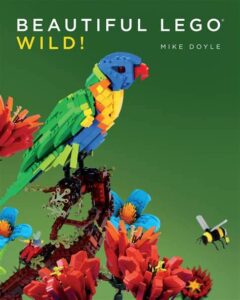 I love LEGO. Do you love LEGO? Your friendly neighborhood readers’ advisory librarian is a huge fan of this interlocking brick system. Honestly, feel free to come by my office at the library to see my collection. I have a whole garden of flowers and a small collection of books, even a pop-up book. At home my collection is slightly nerdier, including many Star Wars ships, The Big Bang Theory set, Disney Villains, and even a LEGO Atari. LEGO has always embraced the idea that they are for everyone, but it wasn’t until 2017 that they started marketing directly to adults; the first adult age range sets weren’t released until 2020.
I love LEGO. Do you love LEGO? Your friendly neighborhood readers’ advisory librarian is a huge fan of this interlocking brick system. Honestly, feel free to come by my office at the library to see my collection. I have a whole garden of flowers and a small collection of books, even a pop-up book. At home my collection is slightly nerdier, including many Star Wars ships, The Big Bang Theory set, Disney Villains, and even a LEGO Atari. LEGO has always embraced the idea that they are for everyone, but it wasn’t until 2017 that they started marketing directly to adults; the first adult age range sets weren’t released until 2020.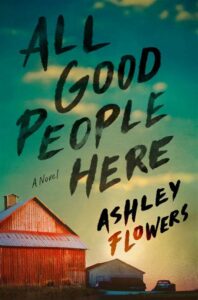 The pools are closed, kids are back in school, and the call of pumpkin patches and cozy socks has begun to tempt me into believing autumn is near. While the Kansas weather may disagree, I’ve begun daydreaming of sweater weather with chilly nights and brisk mornings. At times I even allow myself to imagine an evening walk without the threat of mosquitoes. But while my zinnias are still in full bloom and tomatoes continue to ripen on the vine, I’ll have to settle for the chill of mystery and thriller books – with the aid of central air – for a few more weeks.
The pools are closed, kids are back in school, and the call of pumpkin patches and cozy socks has begun to tempt me into believing autumn is near. While the Kansas weather may disagree, I’ve begun daydreaming of sweater weather with chilly nights and brisk mornings. At times I even allow myself to imagine an evening walk without the threat of mosquitoes. But while my zinnias are still in full bloom and tomatoes continue to ripen on the vine, I’ll have to settle for the chill of mystery and thriller books – with the aid of central air – for a few more weeks.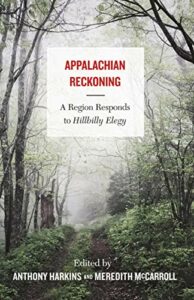
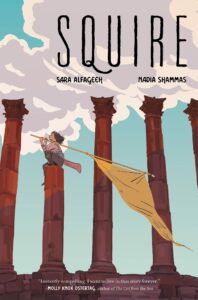 As an avid reader of Sci-Fi and Fantasy books, visualizing the world the author is creating is crucial. Being able to take the words from the page and build them into rich worlds that are interconnected and vital to the story is key, yet most people will visualize characters and settings differently than the next. This is a fun way to flex one’s creativity and the world is made better by those who take these thoughts and create and share fanart of their favorite books. However, when an author decides to write a graphic novel the illustrations are specifically chosen for the story, a point that cannot be overstated. The author, who doubles as the illustrator for some novels, can also remove any ambiguity about character design and the world by using this format. Graphic novels uniquely combine visual art with written narratives: illustrations, vibrant colors, and detailed artwork transport readers into captivating worlds. The storyline is equally crucial—amazing visuals must align with a compelling plot to create a successful graphic novel. Graphic novels delve into societal issues through visual interpretations. Works like Marjane Satrapi’s “
As an avid reader of Sci-Fi and Fantasy books, visualizing the world the author is creating is crucial. Being able to take the words from the page and build them into rich worlds that are interconnected and vital to the story is key, yet most people will visualize characters and settings differently than the next. This is a fun way to flex one’s creativity and the world is made better by those who take these thoughts and create and share fanart of their favorite books. However, when an author decides to write a graphic novel the illustrations are specifically chosen for the story, a point that cannot be overstated. The author, who doubles as the illustrator for some novels, can also remove any ambiguity about character design and the world by using this format. Graphic novels uniquely combine visual art with written narratives: illustrations, vibrant colors, and detailed artwork transport readers into captivating worlds. The storyline is equally crucial—amazing visuals must align with a compelling plot to create a successful graphic novel. Graphic novels delve into societal issues through visual interpretations. Works like Marjane Satrapi’s “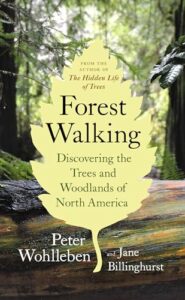 The heat of summer is upon us, and many of us will fill the few nice days with outdoor activities: hikes, trips to the zoo, the county fair, and, of course, the ever-calling draw of swimming. At Manhattan Public Library, we pride ourselves on our diverse program activities. You may have noticed a slew of new adult programs on our calendar thanks to our new Adult Programming Librarian, Victoria. Recently she took a group of 17 library patrons on a hike; it turned out to be a lovely day and a hit. I suspect we will see more outdoor adventures planned in the near future. If you missed the hike, we have created a handy-dandy list of books you can check out to explore the prairie on your own. All information for these titles has been taken from our catalog, which can be accessed at
The heat of summer is upon us, and many of us will fill the few nice days with outdoor activities: hikes, trips to the zoo, the county fair, and, of course, the ever-calling draw of swimming. At Manhattan Public Library, we pride ourselves on our diverse program activities. You may have noticed a slew of new adult programs on our calendar thanks to our new Adult Programming Librarian, Victoria. Recently she took a group of 17 library patrons on a hike; it turned out to be a lovely day and a hit. I suspect we will see more outdoor adventures planned in the near future. If you missed the hike, we have created a handy-dandy list of books you can check out to explore the prairie on your own. All information for these titles has been taken from our catalog, which can be accessed at 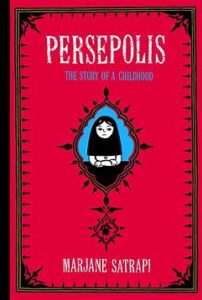
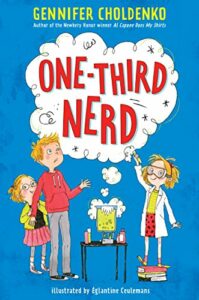 here are a few things I’m truly proud of, and one of them is being the eldest sister of my three brothers. Growing up, there was never a dull moment in our household. From the summer days spent swimming to inventing new tricks on the trampoline, our childhood was full of fun and excitement (despite the occasional sibling squabble). Life got even more exciting when our third brother was born. Despite my not-so-secret desire for a little sister, I was instantly smitten with my new sibling. Then our lives changed in a different way. After he was born, my brother was diagnosed with Down syndrome. When my parents sat me down to explain this news, I was confused and not sure what to think. Would my brother be okay? How/why did this happen? Would other kids—or even adults—be nice to him? Answers to these questions were hard to find. However, after some time, I found them in one of my favorite places: books.
here are a few things I’m truly proud of, and one of them is being the eldest sister of my three brothers. Growing up, there was never a dull moment in our household. From the summer days spent swimming to inventing new tricks on the trampoline, our childhood was full of fun and excitement (despite the occasional sibling squabble). Life got even more exciting when our third brother was born. Despite my not-so-secret desire for a little sister, I was instantly smitten with my new sibling. Then our lives changed in a different way. After he was born, my brother was diagnosed with Down syndrome. When my parents sat me down to explain this news, I was confused and not sure what to think. Would my brother be okay? How/why did this happen? Would other kids—or even adults—be nice to him? Answers to these questions were hard to find. However, after some time, I found them in one of my favorite places: books.